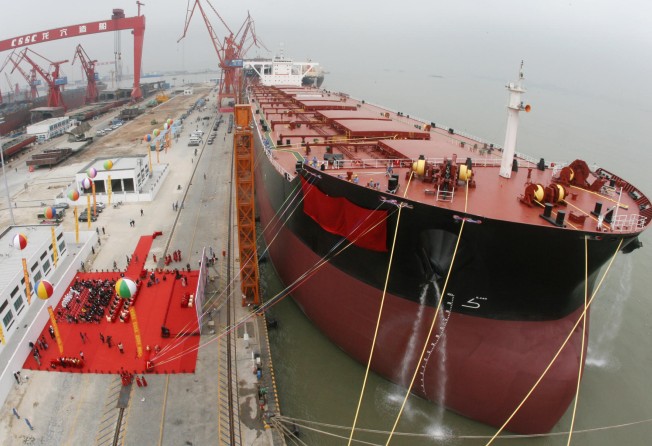China's private shipyards face hard times

The mainland's leading private shipyards are gasping while watching their smaller rivals collapse one after another in an industry where state firms are increasingly raising the stakes.
Five shipyards have filed for bankruptcy this year, as the shipping market continues its prolonged downturn. Despite the bleak weather marked with falling orders, record low prices and tight credit, state and private players are feeling it differently.
"The environment for private companies has never been supportive, but it has taken a turn for the worse recently," said Simon Liang, the chairman of Jiangsu-based Sinopacific Shipbuilding Group, one of the best non-state shipbuilders in the country.
China rose to become the world's top shipbuilding nation during the last trade boom, surpassing Japan and South Korea by exported tonnage. The triumph came at the expense of relentless, and often inferior, capacity expansion, especially in the private sector.
As trade growth ebbed, the industry has been identified by the government as one of the most oversupplied, earning notoriety along with the steel, cement and electrolytic aluminium sectors.
As capacity unwinds, private players are bearing the brunt of the pain. Additional bank lending is all but impossible even for leading private firms with a sound track record.
"Anecdotal evidence suggests it is poor demand coupled with shipyards' inability to secure financing, in particular refund guarantees, that drove the private yards to failure," said Martin Rowe, who heads the Hong Kong branch of Clarksons, the world's largest shipbroker.
Refund guarantees, issued by the seller's bank to ensure pre-delivery payments will be returned to the buyer in case of contractual dispute or cancellation, are the prerequisite for a shipbuilding contract.
The absence of such guarantees as a result of banks pulling credit lines has been a common trigger that precipitated the demise of most private shipyards, which are desperate for orders to stay afloat.
"Commercial banks often adopt a 'cut-off' approach - no lending to private shipyards, end of discussion," said a banker in Shanghai who declined to be named.
Since the beginning of the year, most banks had pared their ship finance portfolios by 10 per cent, the banker said. "Most of the cut has to come from further pulling out on private firms."
A subsidy policy issued two years ago has been driving the wedge further between state and non-state entities. Beijing in 2013 launched a "cash for clunkers" programme that encourages shipping lines to demolish old vessels. Cash rebates are granted when old ships are scrapped and new ones of equivalent tonnage are ordered.
The policy sets no open restriction on participants. However, it is tailored in a way that can only be economical for state shipping lines and shipyards.
The policy has created a slew of orders for the two state builders, China Shipbuilding Industry Corp and China State Shipbuilding Corp, often dubbed as the northern and southern shipbuilders. Private firms have not received any orders under the programme, which ends in 2017.
"We are used to such a difference. As private firms, we won't even dream of being eligible for such a policy," said Liang, who last Thursday agreed to sell a subsidiary specialising in building gas carriers for 700 million yuan (HK$847.8 million) to state-owned China International Marine Containers.
The cash rebate programme is part of a broader policy to boost the share of a Chinese-built and owned fleet for shipping the country's imports and exports. Private firms, again, are left in the cold.
Gao Zefeng, an assistant general manager at the Export-Import Bank of China, said the bank still supported top private yards.
"We were the only bank still lending to Rongsheng Heavy Industries when others pulled out," Gao said. "Many private yards indeed struggle to survive, or are being wound up. But there are also a few that have withstood the downturn and even fared better than state peers."
The policy bank has extended and committed 96 billion yuan in seller's credit to shipyards over the past three years, with a further US$15.8 billion in buyer's credit to foreign shipowners with orders in China.
Of the 50 billion yuan seller's credit, more than half is extended to state shipyards. "China's shipbuilding industry badly needs consolidation. I'm still confident leading private shipyards will survive and even thrive in the ongoing consolidation," Gao said.